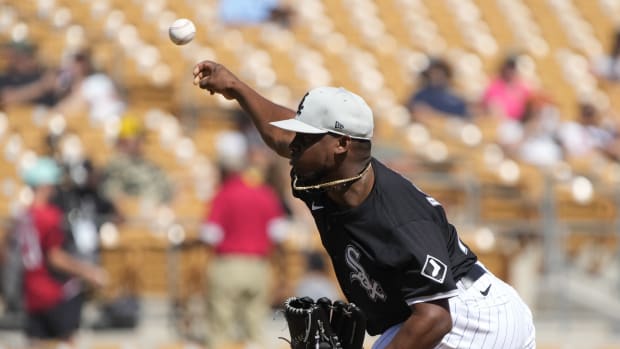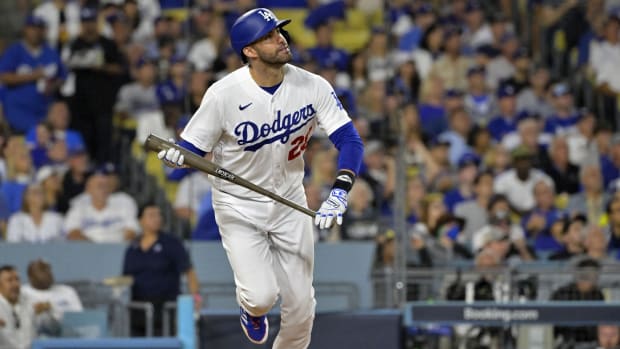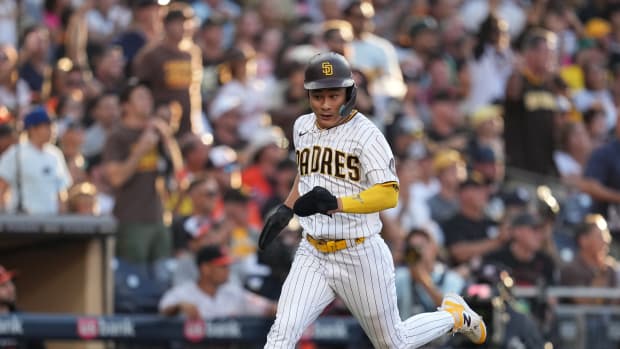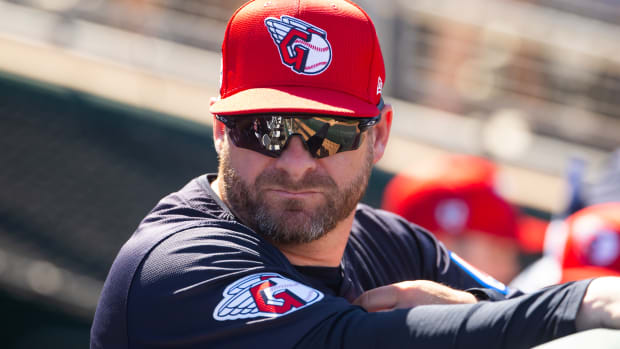Manny Machado Arrives at First World Series Type-Cast as Fall Classic Villain
MILWAUKEE — When the injury to shortstop Corey Seager punched a massive hole in the Los Angeles Dodgers, and the team began gathering intelligence on Baltimore Orioles shortstop Manny Machado as a possible patch midseason, Dodgers hitting coach Turner Ward called his friend and former minor league teammate Buck Showalter.
“All you need to know,” the Orioles manager told Ward, “is that we call him Snow Leopard.”
“Snow Leopard?” replied a stumped Ward.
“Snow Leopard,” Showalter said, “because what this guy does on a baseball field makes him a rare species. There are only a few who can do what he does.”
Dodgers Coast in Game 7 to Reach Second Straight World Series
The Dodgers are returning to the World Series, thanks to a clinical 5-1 dismissal of a game Milwaukee team in National League Championship Series Game 7 Saturday night. It is a trip they probably do not make without Machado, equal parts panache and perplexing.
Just getting Machado wasn’t enough for the Dodgers. It took Machado buying into some serious defensive tutoring by the Los Angeles coaching staff to improve his defense. It took one of the most brilliant ad hoc baseball plays I’ve ever seen in the heat of a winner-take-all postseason game—a 3-and-2 bunt single in Game 7 that preceded a two-run homer by Cody Bellinger that provided all the runs Los Angeles would need to go back to the World Series.
Mostly, it took Machado standing up to severe and constant opprobrium, the result of his foolish and reckless kicking of Milwaukee first baseman Jesus Aguilar in Game 4, not to mention his admission of eight years of baserunning lethargy in which he claimed he is no self-styled “Johnny Hustle.”
“My goodness,” said infield coach Chris Woodward after Game 7, “I’ve never heard a crowd that loud and that constant getting on a player. They were all over him. And it … never … stopped. Usually a crowd gets on a guy at first and it wears down. Not here. They never let up.”
The echoes of disgust will not fade now that he’s out of Miller Park. Machado is going to his first World Series—in of all places, Boston, where heckling is a virtue and Machado brings out the contemptuousness in Bostonians like few other ballplayers.
Welcome to your first World Series, Manny. You have been assigned the role of the villain. And sorry for the type-casting.
“Manny’s been great for us,” Woodward said. “People see a guy who’s nonchalant and looks like a ‘look at me guy.’ I get it. He can come off that way. But he’s such an intelligent player, he works hard and we’ve seen what he can do. He’s amazing. I tell him, ‘You don’t need the ‘look at me’ part.’ You’re great without it.’”
Most of the malevolence in Boston stems from 2017, when a dustup between Machado and the Red Sox eventually exploded into a beanball war and a profanity-laced tirade by Machado. The short version of what happened goes like this: Machado slid over second base on an otherwise routine force play at second base and clipped the knee of beloved Boston second baseman Dustin Pedroia—whose knee has never fully recovered.
Your 2018 Postseason Gear is Here! Check Out the Sports Illustrated Fan Shop
Two days later, Matt Barnes threw a fastball behind Machado’s head. In the next series between the teams, the Red Sox threw at him again, but missed. Then Machado hit a homer at Fenway—and Cadillacked around the bases so slowly he should have had his hazard lights on. That only ticked off the Red Sox even more. So they threw at him again—this time with Chris Sale whizzing a heater behind his legs.
That was it. Machado had enough. After the game he ripped off 22 expletives within a 75-second rant in which he said about what the Red Sox did to him, “That’s [bleeping bleep] coward stuff.”
In the most printable passage of his staccato oratory, Machado said, “I’ve lost my respect for that organization, that coaching staff, everyone over there …”
Hoo-kay. So here’s what we get Tuesday to start the World Series: Machado back at Fenway. Against Sale in Game 1. Coming off his “Johnny Hustle” line and his $10,000 fine for going out of his way to hit Aguilar. Who wrote this script, Vince McMahon?
There’s no running from his status as a villain, which he seemed to embrace at Miller Park. After he whiffed in his first at-bat here in Game 6, Machado, as he headed into the dugout, actually waved his arms like an orchestra conductor asking the Milwaukee fans to give him more volume.
What he did his first time up in Game 7, amid the same cacophonous opus of vitriol, said even more about Machado’s steadfastness. On a full count, Milwaukee starter Jhoulys Chacin stepped directly toward the plate rather than taking the usual leg kick to delivery his pitch. The maneuver equates to a legal quick pitch, and is designed to catch the hitter off guard, before the hitter can begin his usual timing mechanisms.
“Manny wasn’t thinking anything,” Ward said. “Believe me, a full count bunt was never in anybody’s plans and never in anybody’s thoughts. We were as surprised as the rest of the world when he bunted.”
Bellinger, waiting on deck, was stunned by what he saw.
“Chacin quick-pitched him and he didn’t have time to swing,” Bellinger said. “I saw him just react. He didn’t have time to swing, so he just bunted—perfectly. I mean, who does that?”
Said Machado, “I don’t know, man. I just did what I did. It’s all I could do.”
Craig Counsell's Unconventional Managing, Life Story Have Brewers in Game 7
Machado had no two-strike bunt hits in his career—probably in his life. But trailing 1-0 to the Brewers in NLCS Game 7, he decided on the spot as Chacin quick-pitched him that he better try one right there. He squared, did not rush with his lower half as many players do when they try to bunt for a hit, and dropped the most perfect bunt you could imagine toward a stunned Milwaukee third baseman Mike Moustakas, who could do nothing but metaphorically put it in his pocket.
This wasn’t just another bunt. It was the “Starry Night” of bunts. It was an oil painting of a bunt that will hang forever in postseason lore.
“That’s why he’s the Snow Leopard,” Ward said. “He has such a sweet move to the ball with his swing, he hits many different pitches in all kinds of locations, he can be super aggressive and be super patient depending on what’s called for … and he can drop a two-strike bunt for a hit.”
Before Machado joined Los Angeles, his defense at shortstop for Baltimore graded out poorly. On the first day Machado joined the Dodgers, Woodward sat him down—in Miller Park, as it happened—and challenged him.
“I know what the numbers say,” Woodward told him. “You’re a good shortstop but you should be great. If you just get your glove on a ball the batter’s out. What we need to do is get a better jump off the bat.”
Machado had played the shortstop position relying too much on his explosive arm strength and his superb reactions. But the anticipatory part of the position was missing. Machado would simply read the ball off the bat. To play shortstop in the big leagues at an elite level, that’s too late. He wasn’t adept at reading signs and patterns.
Woodward coached him in regards to following along with the pitcher’s sequence and execution and the scouting reports on the hitters. If Clayton Kershaw throws a backdoor slider as opposed to a front door slider, for instance, the shortstop has to anticipate the play differently.
“You mean to be moving before the ball is hit?” he asked Woodward.
“Exactly,” Woodward said. “If we want you in a plus-one pull position and it’s a breaking ball you should be moving before the ball is hit. We have pitchers who execute here. Maybe in Baltimore they didn’t execute the way our pitchers can. But when we call for a certain pitch in a certain spot you can count on our pitchers getting the ball there. And when you do that, you’re going to get to more balls.”
Said Woodward, “I’m lucky because Manny is like Corey in how he plays the position. He’s tall and rangy. I’m never been around anyone who processes the information better than Corey. With Manny, he has the full buy-in on that now. He has more skills and talent than any other infielder I’ve ever come across.”
The World Series is a glamour series, the baseball cousin of Celtics-Lakers. The Red Sox look for their fourth championship in 15 seasons. The Dodgers look to break a 30-year championship drought, their longest since moving to Los Angeles. You have Cy Young winners (Clayton Kershaw, David Price and Rick Porcello), a soon-to-be MVP (Mookie Betts), a former Rookie of the Year (Cody Bellinger), the two most prolific closers over the past seven years (Craig Kimbrel and Kenley Jansen), two minority managers who were teammates for three years with the Dodgers (Alex Cora and Dave Roberts); two of the three oldest ballparks in baseball (Fenway Park and Dodger Stadium) and two storied franchises who haven’t met in the World Series since 1916, when Babe Ruth starred for the Red Sox and Casey Stengel for the Brooklyn Robins. It’s the first coast-to-coast series in two decades—since the Yankees and Padres met in 1998.
And yet at the center of this entire vortex is Machado. He is the dominant face and force of this series. You will be sure of this when he steps into the box against Sale on Tuesday night in World Series Game 1. You will be able to close your eyes and be sure of it because you need only to hear to know that Machado is in the World Series and the World Series is in Boston.
The Snow Leopard is a fascinating cat. It lacks the physical ability to roar. But with Machado, the roar follows him. Now that he’s in the World Series, the roar only grows louder.



































